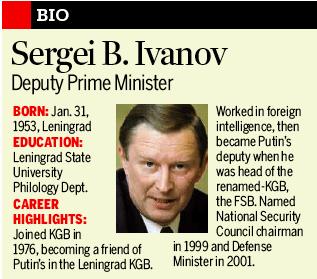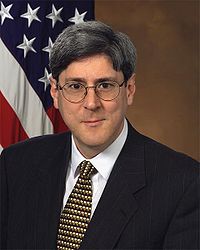
With this flourish of Russian grit, Mr. Ivanov expressed Moscow’s resolve to oppose America’s missile defense plans on a day when President Bush was on the telephone to President Vladimir V. Putin. Mr. Bush was seeking to buttress their personal relationship as the two men prepare for an autumn of summitry and high drama over whether the United States will withdraw from the 1972 Antiballistic Missile Treaty.
Kremlin officials were characteristically vague about the conversation, saying only that the two leaders had expressed “their satisfaction with the development” of relations. But their conversation took place against a backdrop of growing frustration in Moscow with the Bush administration’s unwillingness to describe in any detail what its missile defense plans entail and the timetable for carrying them out.
Though Mr. Bush and Mr. Putin have declared that the United States and Russia are no longer enemies, military leaders in both countries have said they are taking steps that reflect a decline in trust.
On Sunday, the United States and Canada announced that they would send fighter jets and surveillance aircraft to monitor routine Russian military exercises in the Arctic region and the North Pacific.
“This is an issue where we’re not expecting any threat from the Russians,” said Capt. Ed Thomas, a spokesman for the American Air Defense Command. “But in our mission to ensure the sovereignty of the U.S. and Canadian airspace, complacency is something that we can’t afford.”
In Moscow, the commander of the Russian Air Force, Gen. Anatoly Kornukov, said one way Russia might respond to a American withdrawal from the ABM treaty would be to build up its force of strategic bombers. “The long-range strategic aviation of Russia,” he said, is one means of nuclear weapons delivery “that missile defense fails to detect.” Other experts have pointed out that other delivery methods that could not be detected include low-flying cruise missiles, shipping containers and even suitcases.

Douglas J. Feith, the American under secretary of defense for policy, arrived in Moscow today for another round of consultations on Mr. Bush’s expressed goal of rewriting cold war strategic doctrines.
But the Russian defense minister signaled Moscow’s rejection of any proposal that would undermine the treaty and its basic strategic bargain struck 29 years ago : that deterrence against nuclear attack is best achieved by each side’s maintaining an adequate number of offensive nuclear weapons.
During a visit to the Caspian Sea port of Astrakhan, Mr. Ivanov said it would be possible to amend the ABM treaty, but not in a manner that would allow the United States to develop missile defenses to protect the entire country and thereby undermine the basic concept of the treaty.
It is “theoretically” possible to amend the accord, he said, “but what does theoretically mean ? it means it must be clearly understood what kind of missile defense the United States is planning and what kind of technical possibilities are envisaged in the air, on the sea, on the ground and in space.”
Mr. Ivanov was responding in part to comments made on Sunday in Washington by Mr. Bush’s national security adviser, Condoleezza Rice, who reiterated that the president is determined to “move beyond the ABM treaty.”
Mr. Bush’s proposals to go forward with testing for a multi-layered national system of radar installations, space-based sensors and interceptor missiles has drawn significant opposition in Congress over questions of basic effectiveness and cost.
Over the weekend, a senior member of Russia’s Parliament ridiculed the consultations that have been under way between Russia and the United States.
“I don’t think the talks have failed,” Dmitri Rogozin, chairman of the foreign affairs committee, told the magazine Vek. “It’s simply that as yet there is nothing to discuss. At each session of the talks, the Americans tell us about rogue states and how intelligence reports indicate that by a certain year these states will have three- or four-stage missiles and be capable of posing a threat. We explain how absurd their apprehensions are; they make a show of not understanding, and go on with what they’re doing.”
Source:
http://www.nytimes.com/2001/09/11/i...
See our article : September 11, 2001 : an alibi to break up the ABM treaty
















